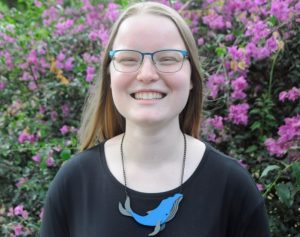Marine biology grad on her way to Cornell

Karianne Kapfer, who graduated from New College in May with a bachelor’s degree in marine biology, will begin a prestigious graduate program at Cornell University this fall. She is on her way to fulfilling her childhood dream of working with marine mammals.
“Ever since I was four years old, I have wanted to work with marine mammals—particularly whales and orcas—but, without New College, none of this would have been possible,” Kapfer said. “If I did not go to New College, I would have never been introduced to the world of marine bioacoustics or found my path.”
Kapfer will further this path during her postgraduate studies at Cornell (a combined master of science and Ph.D. program), as she researches the effects of windmills on marine mammals in the Atlantic Ocean. Her work will focus on natural resources and the environment, with a concentration in conservation.
“The professor I am working for (Dr. Aaron Rice) will soon be studying the effects of windmills on marine mammals in the Atlantic. So I will work on his research, and I will likely conduct my own research in a similar field,” Kapfer said.
It is a field Kapfer was encouraged to explore extensively at New College, during summer internships, Independent Study Projects (ISPs), and research for a thesis entitled Using Acoustic Data to Determine the Seasonality of Humpback (Megaptera novaeangliae), Blue (Balaenoptera musculus), Fin (Balaenoptera physalus), Sperm (Physeter macrocephalus), and Killer Whales (Orcinus orca) Determined by Passive Acoustic Monitoring near Barkley Canyon.
Kapfer also worked as a manatee vocal behavior research assistant during an “African Manatee Vocalization Tutorial” with Athena Rycyk, Ph.D., assistant professor of biology and marine science at New College. Kapfer evaluated signal-to-noise ratios and characterizing confirmed vocalizations, and even presented her findings at the University of Florida Manatee Research Symposium.
“Our team was the first group to study the acoustics of African manatees,” Kapfer said. “We have shared our work at numerous conferences (we will be sharing at the Society for Marine Mammalogy conference this year) and are currently working toward publication.”
Not only did Kapfer receive the tools to conduct cutting-edge research at New College, but she was also supported by personalized resources like the Center for Career Engagement and Opportunity (CEO). The CEO career coaches were instrumental in helping Kapfer seek out and apply for admission to her upcoming (and highly competitive) graduate program.
Upon graduation from Cornell, Kapfer plans to either work as a professor and continue her research, or pursue a career as a civil employee in the public sector.
“In addition to the specific focus of my research, I plan to contribute bioacoustics data to the ongoing efforts of state and federal agencies developing policies, to ensure the conservation of marine life and their habitats,” Kapfer said. “My work will increase knowledge in the field while reducing the harm humans place upon marine life and further conservation efforts.”
Kapfer emphasized how helping Science, Technology, Engineering and Mathematics (STEM) students, and mentoring students with disabilities, is important to her future service to society.
“No matter where I work,” Kapfer began, “I plan to serve as a mentor for students pursuing degrees in STEM education and marine science.”
Yasi Bahmanabadi is an intern in the Office of Communications & Marketing.
